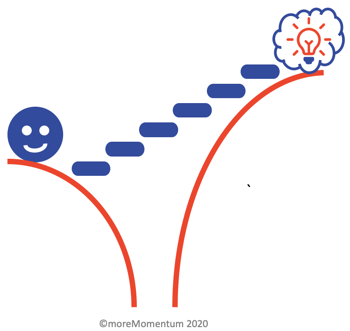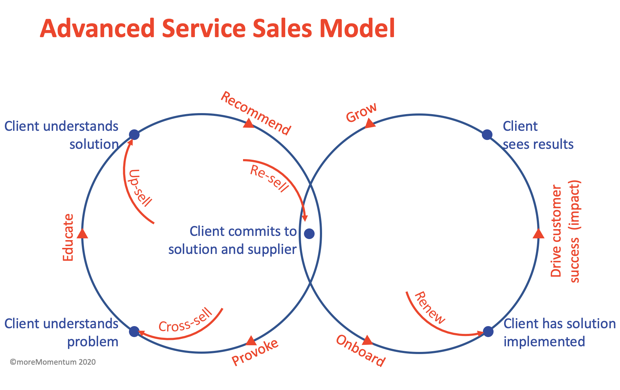Build Your Advanced Service Sales Model
Many manufacturers struggle to commercialise their new and advanced services. Selling advanced services is not only challenging for manufacturers,...

A significant shift in the sales and services sectors characterizes today's business environment. Sales are transitioning from a product-push model to becoming trusted advisors, while services are evolving from an operational function to a strategic business line.
This evolution presents new challenges in selling the business impact of services and growing service businesses amidst advanced alternatives. However, it also opens doors to remarkable growth opportunities.
In a world where product features and benefits often overlap, selling the value that differentiates your advanced services becomes paramount. This is where specific sales methodologies come into play.
Each of these methodologies, when applied correctly, can shift the focus from merely selling features and benefits to selling value.
A vital part of selling value is having a sales team that is well-equipped to do so. Sales training and development are fundamental to equipping your salespeople with the necessary skills, knowledge, customer insights and industry insights to apply these sales methodologies effectively.
Sales enablement tools and resources, such as CRM systems, sales playbooks, and training programs, play a crucial role in this process. They provide the sales team with the necessary information, content, and tools that help them sell more effectively. Implementing a robust sales enablement strategy can significantly enhance your team's ability to sell value instead of just features and benefits.
Understanding your customer's unique needs and tailoring your sales approach accordingly is critical to selling value. Different customers are at different stages of awareness, and your sales approach should be adjusted accordingly.
For instance, a customer just realizing they have a problem (symptom aware) may not respond to the same sales tactics as a customer already aware of potential solutions (solution aware). By understanding where your customer is in their buying journey and their specific needs, you can tailor your approach to sell the most relevant services, effectively demonstrating the unique value your company offers.
Increasing business volume with existing customers is a powerful strategy for growth, and it revolves around four key tactics: renewal, reselling, cross-selling, and upselling.
Renewal involves getting customers to recommit to your services at the end of a contract period. Reselling refers to selling additional units or volumes of the same service to a customer. Cross-selling is about encouraging customers to buy related or complementary services, often to new stakeholders in your customers' organizations. Upselling, on the other hand, involves promoting higher-end, more expensive services to existing customers.
When executed effectively, these strategies can significantly increase your customers' lifetime value and contribute to your overall business growth.
One of the primary tasks of a service salesperson and account manager is to prepare customers for the ''next step'' in their service journey.
This involves educating and guiding customers towards more advanced services delivering greater value and efficiency. This preparation can include informative content, personalized consultations, or hands-on demonstrations. The aim is to help customers understand the benefits of advanced services and how they can contribute to their strategic goals.
Integral to this process is the role of customer success management, which ensures customers achieve their desired outcomes while using your services, and see these outcomes drive customer loyalty and prepare them for advanced offerings.
This process of customer education and success management prepares customers for more advanced service options, strengthens the customer relationship, and fosters trust and loyalty.
Different customers have different needs, and different services require different selling approaches. This necessitates a diverse range of sales profiles within your team.
For instance, a salesperson specializing in renewal and reselling may need to maintain relationships and ensure customer satisfaction. In contrast, a salesperson focusing on upselling and cross-selling might need to be skilled at identifying customer needs and presenting appropriate solutions.
Furthermore, selling advanced services may require salespeople with a deep understanding of the services and the ability to articulate their value proposition effectively. Therefore, diversifying your sales team's profiles can equip your business to cater to various customer needs and service offerings more effectively.
In many organizations, there's a clear distinction between equipment sales teams and service sales teams. The equipment sales teams excel at demonstrating the value and functionality of these products to potential customers.
On the other hand, service sales teams specialize in selling the company's services, often requiring a more consultative sales approach, emphasizing long-term value and ongoing support. This is particularly the case when selling advanced operational performance or outcome-based services.
Having separate teams for equipment and services can have several benefits. It allows for specialization, where each team can focus on what it does best. It also makes it easier to measure performance and set relevant goals.
However, this approach can also create challenges. It can lead to silos within the sales function, making it harder to provide customers with a unified and comprehensive solution. Thus, it's essential to ensure strong coordination and communication between the two teams.
As services become more advanced and specialized, it's beneficial to have sales experts with in-depth knowledge of different service offerings. These experts can better understand customer needs related to specific services, effectively communicate the value proposition, and provide more personalized customer experiences. They can also serve as trusted advisors to customers, providing guidance and advice based on their specialised knowledge.
The terms ''low-touch'' and ''high-touch'' refer to different sales approaches. A low-touch sales model is typically automated and requires minimal human interaction. It'sIt's often used for lower-cost services where the decision-making process is straightforward.
On the other hand, a high-touch sales model involves more direct and personal interaction with customers. This model is commonly used for high-value or complex services where customers need more guidance and support throughout the sales process.
Both models have their strengths and can be effective in different situations. Low-touch sales can be efficient and scalable, allowing you to reach many customers at a relatively low cost. High-touch sales, while resource-intensive, can lead to higher customer satisfaction and loyalty, particularly for complex or advanced services.
Choosing the right balance between low-touch and high-touch sales teams depends on various factors, including the nature of your services, the complexity of the customer's needs, and your company's overall sales strategy.
As we navigate the transforming landscape of sales and service sectors, it's clear that advancing your service sales approach is advantageous and crucial. The shift from product push to becoming trusted advisors and from operational aftermarket function to strategic business lines presents both challenges and opportunities.
We've explored key strategies, from selling value over features and benefits to expanding business volume with existing customers and effectively organizing your service sales function. These approaches, coupled with different sales methodologies and the critical role of customer success management, can propel your company to steady growth in existing and new services.
However, this discussion is just the beginning. The Executive Service Roundtable in April offered a platform for a deeper exploration of these topics. We invite you to view the post-event material to delve into strategies to sell advanced services better and shape the future of our industry.
View the recording, slides and meeting notes of the Roundtable.
Subscribe for the our Impulse Letter
With regular updates about service news, trends and best practices.

Many manufacturers struggle to commercialise their new and advanced services. Selling advanced services is not only challenging for manufacturers,...

Unlocking value in data-driven services is vital to strategic business growth and operational efficiency. Explore frameworks, strategies, and...

Mastering service innovation in data-driven solutions requires overcoming challenges like strategic alignment, balancing goals, and managing risks....